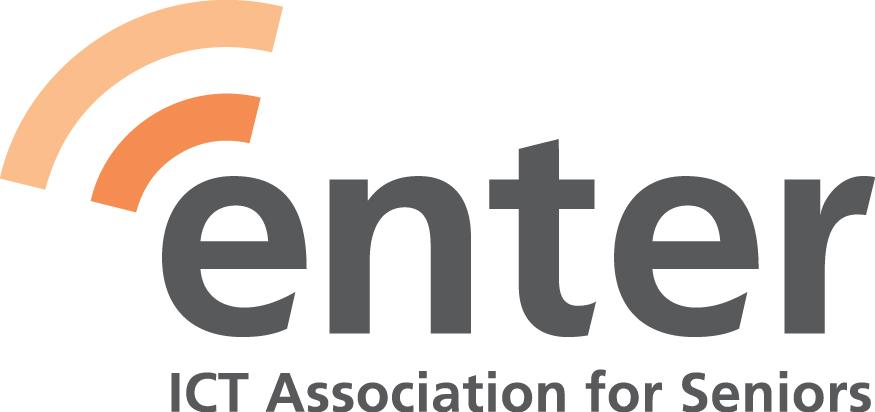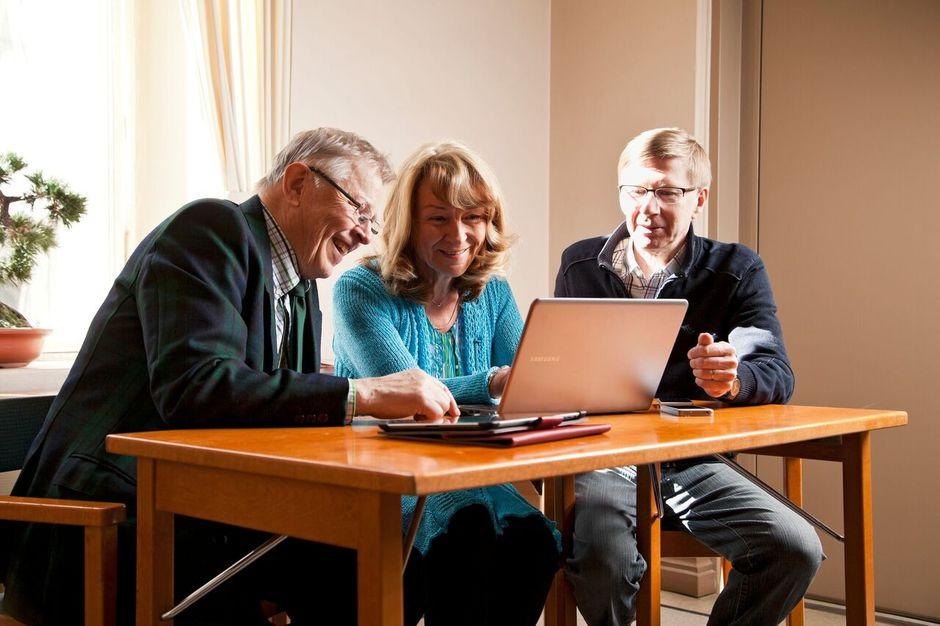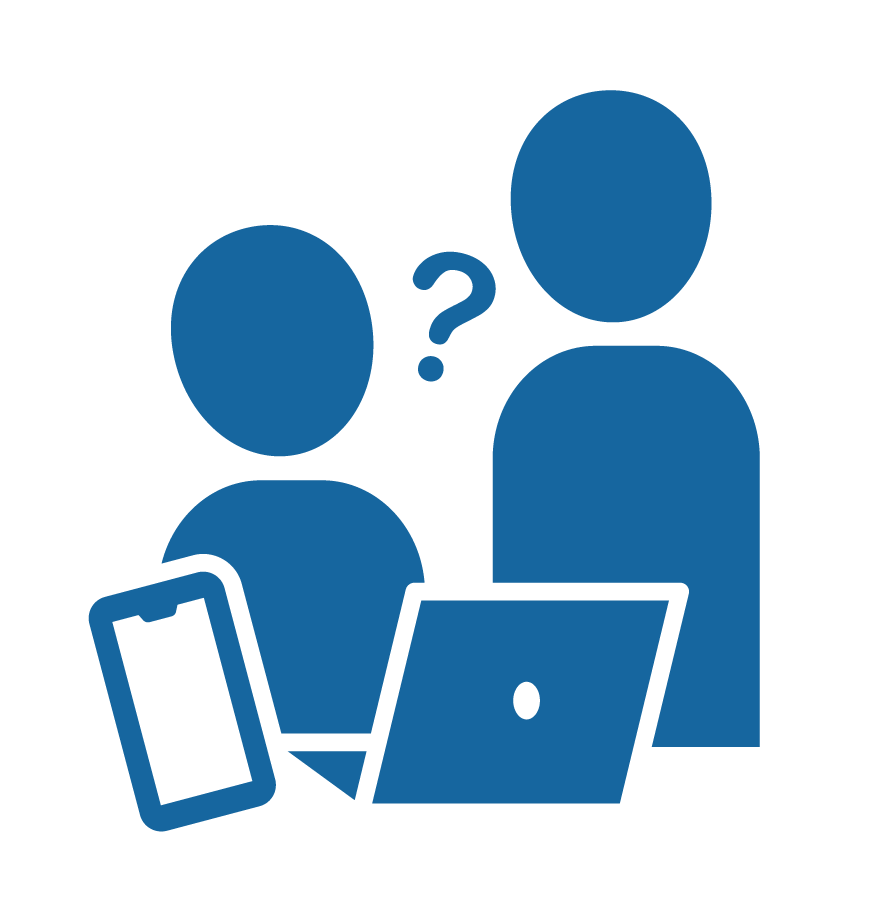Enter ry in English
The Enter registered association was founded to help seniors who are interested in today's information and communications technology (ICT).

Many everyday services are nowadays available only online. Despite this, studies show that the motivation for learning to use new devices or technology drops after retirement. In Enter, we don’t want to miss out on technological progress. Instead, we want to keep up with latest developments and learn to use today's ICT on our own terms.
Our main functions:
- to provide peer-to-peer digital support for free to seniors who have computer or mobile phone or tablet questions or problems

- to organize lectures offering a slow pace and concrete examples to help to spread knowledge about the use of computers, mobile phones, tablets and digital services
- to organize trips and events for members
- to ensure that seniors' needs are considered in public ICT projects
We have 200 volunteers who give digital support to seniors.
We operate in some 80 places around Southern Finland (Uusimaa).



Where to get Enter's Digital Support in English?
Helsinki
See addresses and schedules here.
Libraries:
- Keskustakirjasto Oodi
(Helsinki Central Library Oodi) - Oulunkylän kirjasto
- Rikhardinkadun kirjasto
- Töölön kirjasto
Also, at: - Kalliolan Setlementtitalo (Kalliola Settlement House in Alppiharju)

Enter registered association, Abstract of the annual report of activities, 2021
Enter is an information technology association for senior citizens, operating in Uusimaa province, South of Finland. Its main purpose is to improve older adults’ information and communication technology skills and digital inclusion in society. The main means for this are through the personal support of volunteers and the medium of lectures and discussions, but also by encouraging self-study.
Enter is an open and impartial information technology association for older adults, and we want to encourage them to learn. These values and starting points are present in all activities of the association.
.png)
In 2021, ENTER’s activities continued to be affected by the Covid-19 pandemic as they had been earlier in 2020, and radical, new changes were not considered necessary. Due to restrictions on business premises and gatherings, ENTER’s local close support was at a standstill throughout the spring season. ENTER’s remote support for people, however, and other distance activities proved very popular. The remote classes that began on March the 13 th , 2020 continued throughout 2021. As a novelty, we tried close support outdoors in a few library yards in the Helsinki metropolitan area. Most of the local support sites were opened for the autumn season.
ENTER’s activities continued to be lively as we inspired many senior citizens to get involved remotely. In the spring, constraints were common and face-to-face support was scarce everywhere, meaning increasing need for electronic communication between relatives and friends. One of the aims for 2021 in the action plan was to motivate members for digital activities: “We support and encourage senior citizens to strive for digital boldness. We are looking for ways to increase their self-confidence and inclusion in the digital society.”
According to our self-rating, we succeeded well in this: many members, for example, dared to try remote support when it was first explained to them how it works. We offered a lot of encouragement and help in using the video conferencing programs for the house cooperative meetings or college distance learning courses, for example.
At the end of 2021, ENTER had a total of 67 local support sites in 15 municipalities. There were 136 volunteers involved in technology support activities either face-to-face or remotely. We offered support 3 660 times during the year for a total of 4 455 hours. Of these, 1 130, or 30 percent, was remote support.
The various educational events were fewer than in previous years. However, as the events were mainly organized remotely, there were significantly more participants than earlier. Of the events, 22 were open to all senior citizens, 13 to other associations, 21 to ENTER’s membership, and 34 to ENTER’s volunteers. There were a total of 3 294 listeners and attendees at all events.
In the fall, the association began creating its first official strategy for 2022–2024. Towards the end of the year, the association's rules were also updated to better reflect its future strategy of replacing community membership with support membership instead.
At the end of the year, the IT Institute Foundation honoured ENTER with the ProICT Award 2021. In its announcement, it said it “wanted to express, in making the ProICT award, its appreciation for the activities of ENTER and hopes for continuity in this relevant work. The work done by ENTER is an investment in the realization of a digital society, it encourages and strengthens individuals' skills in information technologies and thus makes everyday life easier by with a more independent management of people’s affairs.”
The Funding Centre for Social Welfare and Health Organisations (STEA) continued to be the main sponsor of the association. STEA's project funding for the expansion in 2018–2020 was left for use until the end of July 2021, and from August onwards the project operation merged into the association's STEA operating grant. Funding was also received from the cities of Helsinki, Espoo and Vantaa. In addition, the Helena Lavikainen Foundation awarded ENTER a grant to support the renewal of the website and finance the autumn meeting of the instructors.
We were a member in the Digitalisation for the Everyday Life Advisory Board founded by the Ministry of Finance and responsible for the digitalisation of public services. It forms a channel for cooperation and dialogue between non-governmental organisations, researchers and authorities. At the end of the year we were also involved in the Uusimaa digital support project, in several Uusimaa digital networks, and in the national Senior Surf network. The association also worked closely with many organisations acting for older people, as well as cities, libraries, and sheltered homes.
Key words: senior citizens, non-governmental organisations, information and communication technology, society, volunteer work